

Marvel Comics Presents ran for 175 issues from 1988 until 1995. Each issue included four eight-page stories with typically two or three on-going features (and no ads). It spotlighted some of the leading creators of mainstream comics over a period of precipitous economic growth and even more rapid decline. Reading through it is an opportunity to revisit any number of weird aspects of 90s superhero comics. This blog is a primitive, oddly regimented, manifestly scattershot crawl through an often disappointing but occasionally splendid comic. All image copyrights are Marvel's. Issue credits linked below. Updated on Wednesdays.
Marvel Comics Presents #42: January 1990(7.8.20)
Credits: grandcomicsdatabase
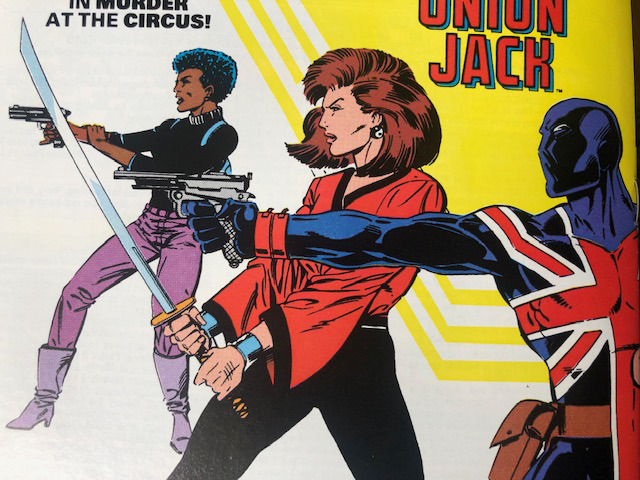
Bob Layton makes full use of the wraparound cover to offer up a pose-heavy lineup of characters. While Wonder Man looks like a fish out of water here, the Daughters of the Dragon are an overdue appearance and also occupy a fun cornerbox. A stark contrast to the recent over-stuffed covers, this is about as streamlined a cover as we've yet seen, bolstered by some super-simple yellow graphic elements. The letters page is a stupefying, full-throated exhortation of the comedic brilliance of Higgins and Larsen's Excalibur feature.
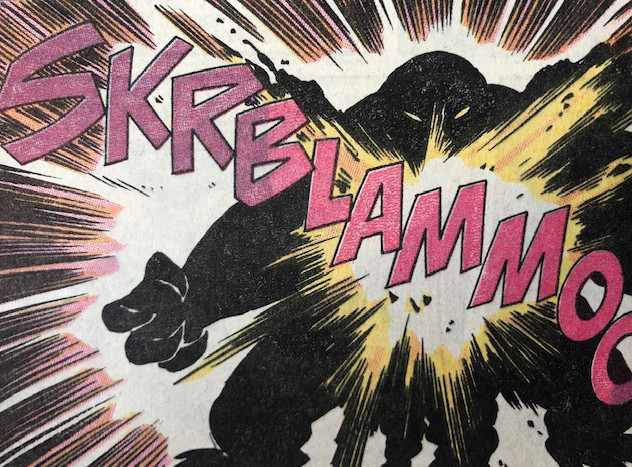
A. Wolverine, "Black Shadow, White Shadow" [5/10]
Things have unspooled rather quickly here. Wolverine and his troupe are now somewhere in "the middle of China" and, for no discernible purpose, continue to seek and encounter Black Shadow (and White Shadow). All of Buscema's pleasant urban setting has been traded in for expansive desert, though there's some capable, minimalist work here. 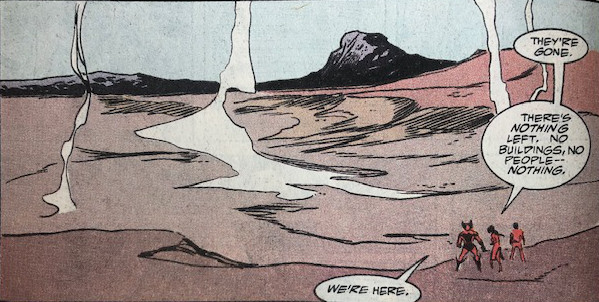
Moebius this ain't, but there's a subtlety to the landscape drawing that's at odds with the prevailing superhero book trends of the time. I'm without any real sense of where things are going apart--of course--from a likely reveal that Mai is the Black Shadow, but it remains relatively easy on the eyes and largely non-boring. And Buscema deserves a note of credit for drawing largely non-terrible horses.

B. Wonder Man, "Stardust Miseries" [5/8]
Wonder Man is somehow brainwashed and transformed into Hank Pym and is immediately sent to terrorize the Wasp. Higgins seems to be on a relentless search for a new bad idea to weave into an already gaudy tapestry of weird, under-written cliches.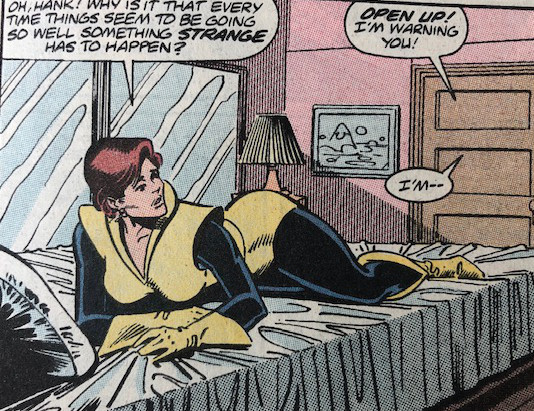
Nothing about this is interesting or comfortable as the overtones of sexual violence get ramped up for the sake of no meaningful narrative end. Interestingly, however, while the storytelling slows to a near-coherent pace, Saltares' work degrades substantially. The apartment setting and action unfolds in a a stiff and inconstant fashion, suggesting that, for all its faults, Higgins' story at least provides the art team a chance to simply do action shots writ small rather than, y'know, tell a story in pictures.
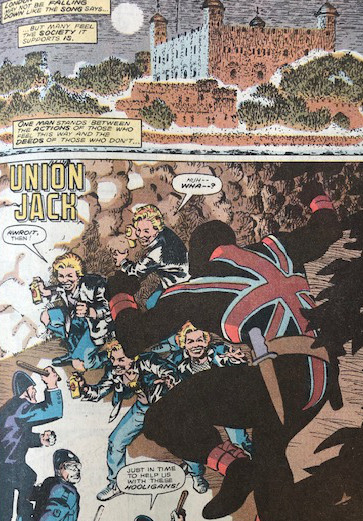
C. Union Jack, "The Establishment"
MCP wades into British politics with Union Jack saving a bunch of anti-Thatcher punks from a group of over-eager "bobbies." After Union Jack narrates his hostility to Tory politics, it turns out the punks are his friends and are eager to vandalize a cemetery. (Nicieza leans all the way into phonetic transcriptions of English accents--i.e., we're firmly in 'oym' and 'awroit' territory.)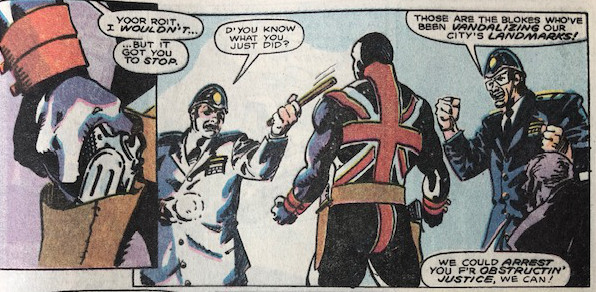
In a limp "good people/both sides" bit of moralizing, it turns out that the graves that were to be vandazlied are actually those of the former Union Jacks, so, naturally, he spooks the punks off. By Nicieza standards, this is remarkably good work, which is mostly to say that it's not blather-ridden dreck.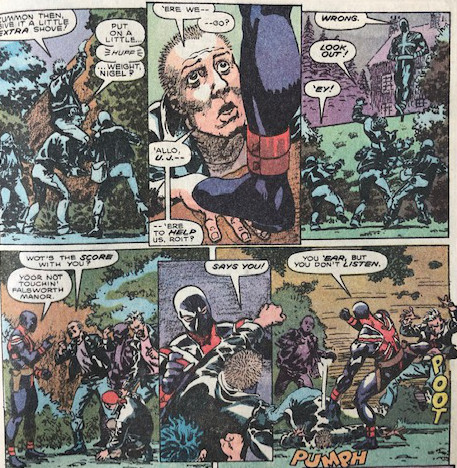
The unabashed highlight here is Kieron Dwyer's color work, which does some fun lighting work, leaving ample open spaces to simulate dusk, "torch," and streetlight effects. It's genuinely lovely work, coupled with some fun layouts and arch-Brit touches. One of the more distinctive-looking one-hitters MCP's offered up of late.
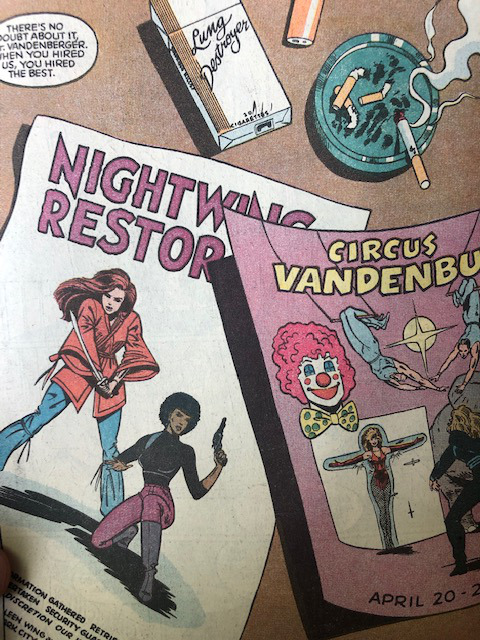
D. Daughters of the Dragon, "Armed and Dangerous"
Colleen and Misty investigate hijinks at a circus with a fun reveal: the knife-throwing co-owner and a clown are the culprits. Compactly and wryly written with Chris Tsuda doing a credible Lim/Adams job, there's an old school mystery feature feel that's slight but undeniably pleasant.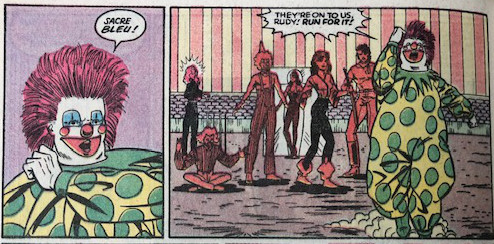
Modestly funny sight gags ("Lung Destroyer" cigarettes and a suitably goofy clown) as well as a chance for Misty to thrash some would-be murderers are ample evidence Jo Duffy is fully aware of what works in these features and how to run two lead characters at the same time. Serviceably fun stuff.
Power Ranking: Union Jack (A-), Daughters of the Dragon (B+), Wolverine (B), Wonder Man (C-)